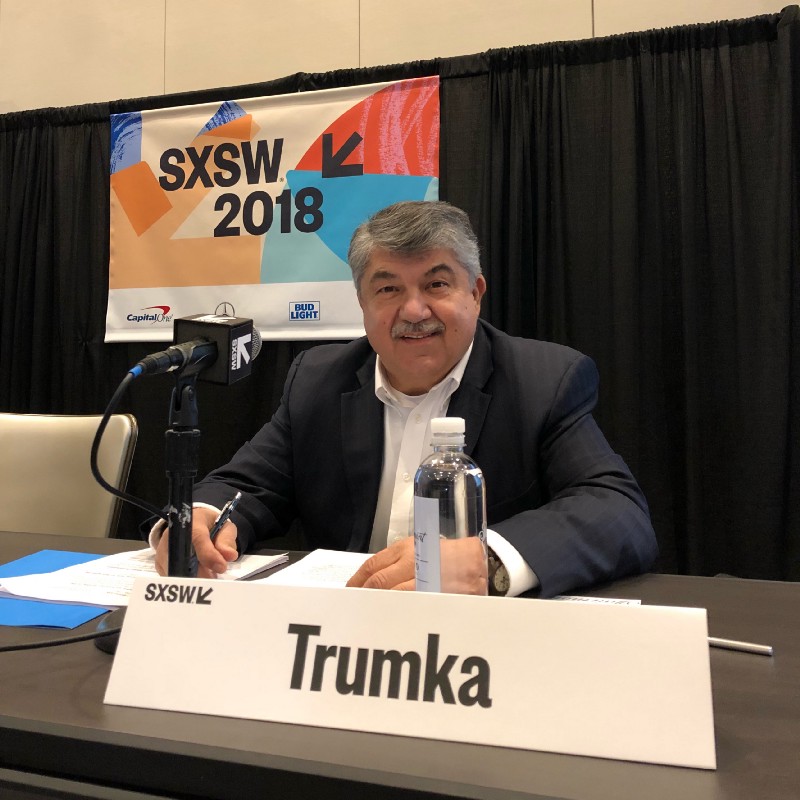
I’ll be honest, the last place I expected to be on a Thursday in March was Austin, Texas, at South by Southwest. As president of the 12.5 million member AFL-CIO, I spend my days advocating for working people on picket lines and in the halls of power. I grew up about 1,500 miles from Austin in the small town of Nemacolin, Pennsylvania. I followed my father and grandfathers into the coal mines, using that experience as the foundation for my career as a trade unionist. “Another day. Another dollar in the hole,” my dad used to say before we left for work. So my journey from digging coal in rural America to a discussion about the “robot uprising” and the “future of work” was a long one indeed.
We’ve always said technology is a good thing. If it makes our jobs safer, more efficient, if it makes us better, if it makes it easier for workers to work, if it eliminates dangers, by all means, let’s grab it and take it and run with it. And, that’s what we’ve done in industry after industry.
As I soaked in the city and the crowds, I immediately knew that I was surrounded by people of very different backgrounds, and that’s exactly why I was there. At the epicenter of the generation and industry driving the conversation at SXSW, the labor movement is too often seen for its place in history rather than the work we are doing to drive massive social change today. So my challenge began with the reminder that the labor movement is one of America’s greatest innovations, conceived on the profound idea that working people are stronger together than we are apart. And it is through this prism of progress and broadly shared prosperity that we seek to shape the future of work.
I was joined on stage by Amazon’s vice president of human resources for worldwide operations. Between their half a million employees and our 12.5 million members, this was easily one of the largest labor-management conversations on the future of work in history. My hope is that it’s the first of many.
The members I represent do nearly every job in our economy, and we do it with skills, professionalism and experience that are unmatched. Today, technology is more ingrained into our work than ever before, whether it’s something as common as email or as complex as artificial intelligence. We embrace advances in technology and systems that allow us to do our jobs faster, better and safer. We’ve done that for decades. But too often what we see today is corporations, including Amazon, using 21st-century breakthroughs as an excuse for 19th-century labor practices. We are using our collective voices to reject that kind of future.
Technology is a tool. And just like any other tool, the way we apply it matters. We are facing a critical choice. Will we allow technology to foster greater inequality, economic uncertainty and social unrest? Or will we demand that technology improve lives and raise standards and wages across the board? To put it more plainly, will technology be used for greed or for good?
I’ve spoken in front of many audiences. Never one quite like South by Southwest. But, I know how to read a room. And let me tell you, not everyone liked what I had to say. These were leaders and innovators in a massive and growing industry, and it was clear that many had spent little to no time thinking about the impact of technology on workers. I asked tough questions because someone has to. It is no different than the safety concerns I raised with coal companies when I first got started in the labor movement. We can never forget that human beings are our most precious resource.
As a nation, we are grappling with these fundamental questions. Over the last 40 years, the most notable change hasn’t been from a conventional to a platform economy — but from an economy where the pay of most people grows as the economy grows, to one where almost all the benefits of economic growth are funneled to those at the top. We’ve gone from an economy where strong unions help turn bad jobs into good jobs and help children do better than their parents, to one where large parts of the economy have no unions at all — where part-time and temporary jobs, scheduling abuse, outsourcing, and misclassified workers are all too common — and where too many young people have lowered their expectations of ever paying off student loans, buying a home, or even landing a good job.
We unabashedly support innovation. From assembly lines to construction sites to Silicon Valley, we have always adapted to new workplace realities with pride, flexibility and unwavering commitment. But our experience has also taught us that there is a right way and a wrong way to unleash new tools. Unfortunately, too much of what we’re seeing today is the wrong way.
The thing that we do the best? We take the simple concept that working people do better when they’re together than when they’re apart. We use that and we make bad jobs good jobs.
I was inspired by my time at SXSW, and it’s a conversation I’m committed to continuing. We can choose to do better. No job has to be a crappy job and no one needs to be left behind. We can demand a world where the gains from technology translate into better pay and better working conditions for everyone, where being more productive means we can spend less time at work and more time with our families, where artificial intelligence allows us to have better and more interesting jobs. We can choose good jobs. So let’s make that choice. And let’s make it together.

